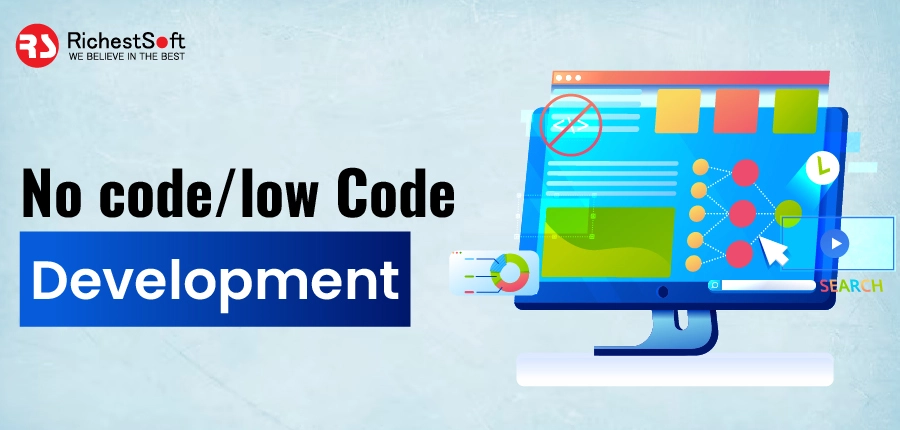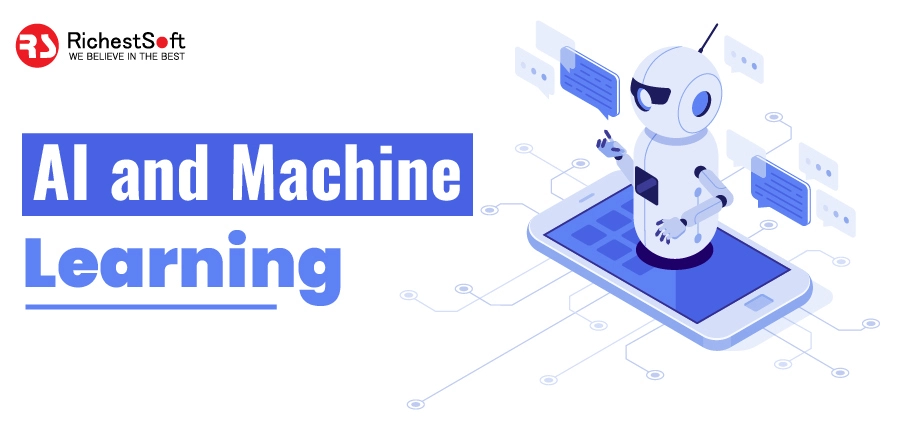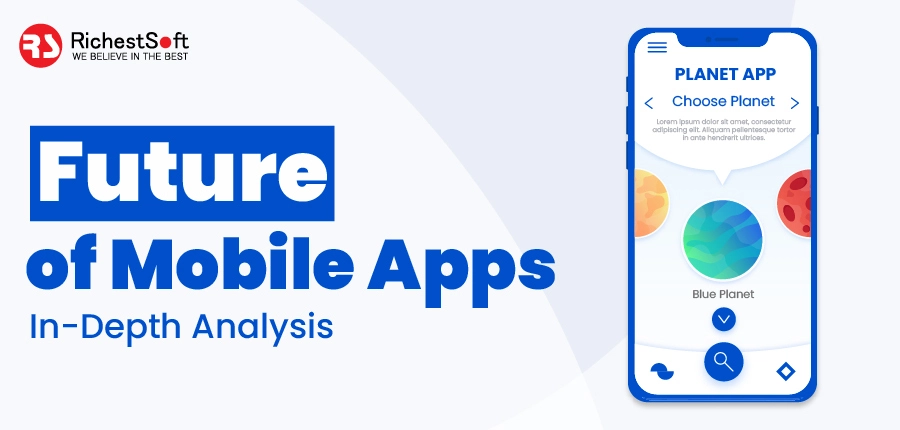Mobile application is one of the significant inventions up to date that has revolutionized almost every aspect of life that makes people comfortable. Starting from business to productivity and communication, the way we think and respond has changed a lot.
If you look at the current scenario, there are almost 2.1 million iOS applications and 2.8 million Android devices applications uploaded to the Play Store. However, these numbers will increase as every business tries to grow itself via mobile apps. In short, the competition is at the top, and it is expected that by the end of 2023 year, mobile applications will see more technological advancements that will embrace new features.
To learn more about the future of mobile applications, let us delve into this post in which we will discuss all about mobile apps.
Future of Mobile Apps – Top Trends We Think Will Be in Use 2023-24 and Near Future

The future of mobile apps is bright as it is getting more advanced than in the past few years. On top of that, mobile applications are not just limited to basic features; they are added up with lots of advanced features, making customers satisfied.
So, let us deep dive into the future of mobile apps by which you will learn how they are getting modified.
Keep reading!
1.OpenAI Technologies in Mobile App Development
If you are looking forward to developing a mobile app for your business or an app that will change the world, OpenAI will be an essential part of it. Do you know what is the reason to choose OpenAI? OpenAI delivers several varied models, technologies, and public APIs that can make the app outstanding.
Some of the best technologies that are changing how we see the world are: predictive analytics, image recognition, and NLP or Natural Language Processing. The developers of mobile apps can easily access OpenAI APIs and SDKs to develop unique mobile app solutions.
Types of mobile app developers can build via OpenAI are: –
- Chatbots
- Personal assistant apps
- Image and video recognition apps
- Content generation apps
2. User Experience with AR/VR
Augmented and virtual reality are prime futuristic technologies to develop phenomenal mobile apps that deliver excellent user experience. Regarding this, you must have seen the popularity of the Pokemon Go App as it is developed to show a built-in ecosystem to find varied Pokemon-like creatures via a camera screen.
In short, augmented reality is the technology that helps individuals to view live objects or graphics in the physical world. However, it creates this virtual world around people by closing the real world. Besides games, virtual reality has also offered significant benefits to e-commerce, marketing, and healthcare.
Moreover, almost every social media site is surrounded by augmented reality, like Snapchat, Instagram, etc., showing creative and attractive stickers to show emotions. Overall, both AR and VR have revolutionized the mobile app development industry, and this trend will continue shortly, making the future of mobile apps intense.
3.Wearable Devices Integration with Mobile Apps

Do not be offended, but do you think wearing a regular watch nowadays is so old-school? It looks awkward, but, indeed, everyone cannot afford it. On top of that, many people love to wear those old watches, and undoubtedly they have become antique pieces with the introduction of tech smartwatches.
Advanced smartwatches are taking the personality of humans to another level as they are saturated by many advanced features like heart rate monitors, can check pulse rate, and many more. Not just smartwatches, mobile apps are also introduced as hearing aids, smart clothing, etc. As per the latest report, the Global wearable technology market will likely expand at a CAGR of 14.6% from 2023 to 2030.
Overall, these wearable devices have become a vital part of everybody’s life and are playing an integral role.
Some of the example how wearable devices make our lives easy: –
- Helps in tracking real-time location
- Use as health monitors or fitness trackers
- Helps in data translation for behavioral changes
- Responds to messages easily on varied platforms – WhatsApp or emails.
4. Blockchain Technology
According to mobile app developers, Blockchain is not just bitcoins and cryptocurrencies; it is the bright future of mobile apps. Crypto technologies and smart contracts deliver full transparency and are one of the most convenient options to develop via Blockchain technology.
The technology of Blockchain will offer an elegant, transparent, connected, and secure future.
On top of that, mobile app developers will get endless possibilities right at the forefront, which will also help in data security in mobile apps. One of the finest examples of Blockchain technology is the NFT market.
5. Security will Become a more Pressing Problem
Currently, everything is online, and due to that, users’ personal information is at risk. That means there is a fear around customer security and privacy. Almost every business tries to make customers happy by offering every product and service online.
That means customer data is collected continually to offer excellent services with the help of AI and machine learning. One of the studies by popular Android apps states that around 63% of the synopsis included open-source components with known app security vulnerabilities. It means the consumer data is hacked or leaked, directly affecting the customer experience.
By keeping the above issues in mind, mobile apps have developed two innovations. The first one is biometric authentication which helps businesses to find the real user via fingerprints, voice, eyes, and facial recognition.
Another innovation that is getting very famous is DLT, distributed ledger technology of which Blockchain is one part. However, DLT technology helps boost IoT security on various devices like mobile, laptops, etc., by offering additional layers of encryption.
6. Contextual and Predictive Experiences
As apps become elegant, they will harness user data, contextual information, and predictive algorithms to offer highly personalized experiences. Apps will adapt to user preferences, anticipate needs, and offer tailored recommendations and suggestions. For example, a travel app might deliver customized itineraries based on user preferences and travel history. These contextual and predictive experiences will enrich user engagement and satisfaction.
7. Going Cashless with Mobile App Wallets

When you look at the development of mobile apps these days, it becomes next to impossible to ignore the radical change mobile app wallets brought. Wallets are undoubtedly still in their nascent stage, but it is getting suitable, making people’s lives easy and convenient.
That means the payment is successful with just one click, and there is no need to stand in a queue to make the payment. This technology in mobile apps increased online transactions and, therefore, users. Before the pandemic, few shop owners and retail outlets delivered online payment options. Post-pandemic, almost every market is integrated with wallets and online payment options to make their customers convenient.
Overall, mobile wallets’ popularity will grow in the future, as it delivers better security and simplification in transactions. Some prominent examples – making people’s lives easy are Google Pay, Paytm Wallet, Apple Pay, Samsung Pay, and many more.
8. 5G will Transform the Wireless Technology
5G is the buzzword these days as it radically changes how people use mobile apps. The wireless technology delivers incredible speed, 100 times faster than 4G. That means 5G can offer people a luxurious life soon.
Apart from speed, this network is also helpful in revolutionizing 3-D gaming, AR/VR gaming, security of data, and many other aspects of mobile applications. Some of the enormous organizations – Apple, Samsung, Blue Star, and LG are introducing new technologies in mobile app development to provide their customers with an excellent user experience.
9. No code/low code Development

In the past, almost every mobile application was built using code, making it challenging for the business to make even a small-scale change. However, by making changes, they have to call the mobile app developers for the replacement.
But with no-code platforms, the mobile app setting can be easily transposed as they allow quick collaboration and help drag-and-drop creation. In short, you do not need any technology or developer to understand the app coding platforms. Another benefit of opting for low-code mobile apps is that businesses can deploy these applications quickly into the market.
10. Support with Chatbot
Chatbot is another invention that is revolving around the future of mobile apps for good judgment. However, it is a distinct aspect of the mobile application development industry. It uses neural language processing and is capable of delivering human-like features. While dealing with Chatbot, you will feel like you are talking to an existent human being as a customer support executive, and they are offering all types of non-technical and technical support.
But there is one thing every individual notices they deal casually and take all the mandatory details before proceeding with the solution. There is a reason why Chatbot offers a feeling like a human is they are trained to do these things. Besides, companies create a flow that works best per their products and services to look more independent.
However, it takes a lot of effort, emotions, and casual conversations. This Chatbot helps in making business extra productive. Regarding the current scenario, companies are moving between bots and humans. But overall, shortly, Chatbots will take the customer support role, and humans will be engaged in more important aspects of the business.
11. Progressive Web Apps (PWAs)
Progressive web apps combine the best features of native apps and websites, providing a more seamless and accessible user experience. PWAs are web-based applications that can be accessed through web browsers but offer functionalities traditionally associated with native apps, such as offline capabilities, push notifications, and device hardware access. As PWAs continue to evolve, they will blur the lines between web and app experiences, offering developers and users greater flexibility and convenience.
12. AI and Machine Learning

AI and ML play a significant role in shaping the future of mobile applications. These technologies help apps to offer more personalized experiences, improve decision-making processes, and automate challenging tasks. AI-powered virtual assistants, predictive analytics, and recommendation systems are already becoming ordinary in mobile apps. In the future, AI and ML will further enhance app capabilities, providing users with exclusive, more intuitive, and context-aware experiences.
FAQs
Q1: What are the top application development technologies?
Ans: There are mainly 5 application development technologies to build mobile apps with advanced features. They are Flutter, Java, Swift, Xamarian, and React Native.
Q2: What are the possible application development trends that will stay soon?
Ans: Numerous app trends will not go in the future, like Blockchain, IoT, Metaverse, and AI. These trends are here to stay and will change how individuals think.
Q3: Why do mobile applications fail?
Ans: The overall performance of a mobile app wholly depends upon many factors that range from competition to marketing budgets. Apart from that, poor process execution and poor research are common reasons mobile apps fail after it is initiated.
Q4: What can be the future of mobile applications in India?
Ans: The industry of mobile apps is growing like anything as more than half of the population is using mobiles. However, if you talk about mobile apps, they are also getting popular with the time. As per the reports, this industry will rise by 92.55 billion by the end of 2026.
Conclusion
As time passes, the future of mobile apps is getting more advanced and helping companies to make their working process easy and convenient. Technologies like Blockchain have become an essential part of the mobile app development process. Apart from that, security with new technologies is reaching new heights that will deliver a high user experience.
So, do you want to take advantage of these technologies in your business? If yes, contact RichestSoft, a leading custom mobile app development company, to build advanced applications with the latest features. Over the years, we are developing various mobile apps for different businesses and helping them grow.
For more information, contact the experts of RichestSoft and take your business to the heights of success.
 +1 315 210 4488
+1 315 210 4488 +91 798 618 8377
+91 798 618 8377


